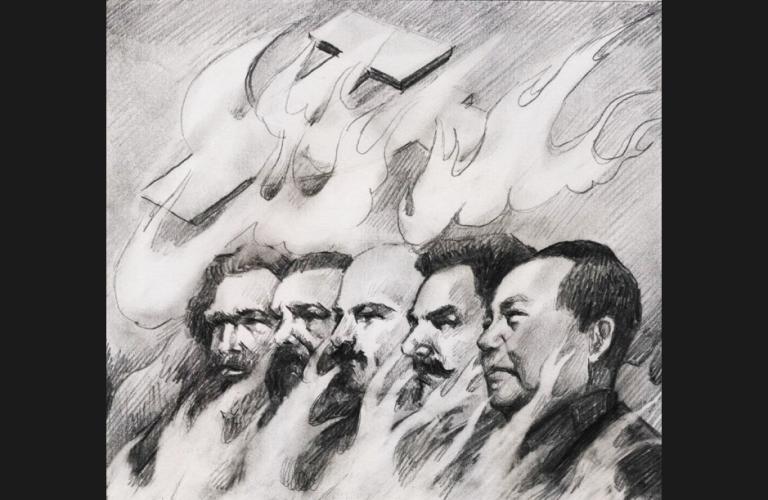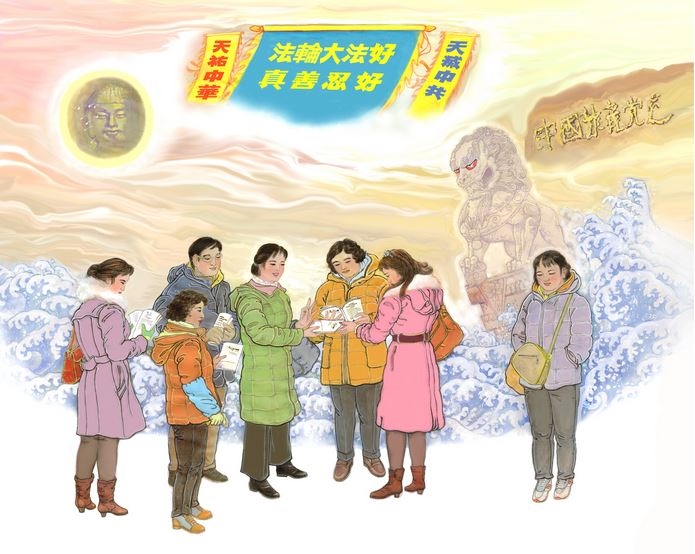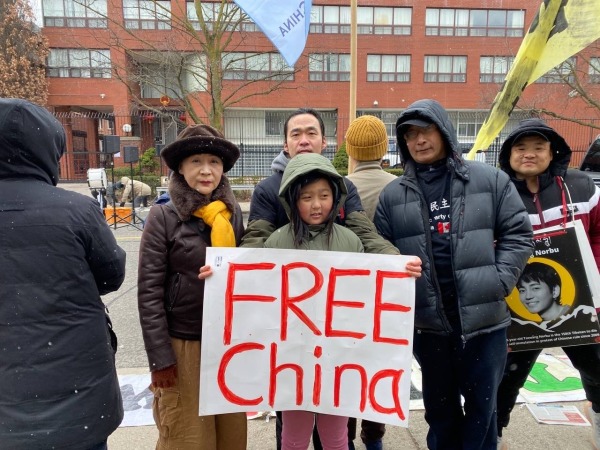First published in 2006 by the Chinese-language Epoch Times, this series lays out in detail the vast system of Communist Party culture that dominates mainland China today and how it violently replaced the ancient moral and spiritual heritage of the Chinese people. Vision Times is proud to present a translation of Disintegrating the Culture of the Chinese Communist Party that sheds light on the fundamental characteristics of the world’s biggest communist state, while keeping true to the message intended by the original authors.
Traditional Chinese Culture and Communist Party Culture (Part III)
Continued from Chapter One (Part II).
Materialist ‘ideals’
Despite claiming to be objective and scientific, the doctrine of dialectical materialism means that for communist regimes and their propagandists, black can be white as long as it serves the interests of the leadership.
During the period of strong economic growth, the CCP cited the needs of material development and the “poor quality” of the Chinese people as justification for denying democracy, freedom of speech, belief, and other human rights.
Yet it was the same CCP, that, prior to seizing power, mobilized its media and sympathizers to criticize the Nationalist Chinese government of authoritarianism.
Success
You are now signed up for our newsletter
Success
Check your email to complete sign up
On March 5, 1944, Communist Party mouthpiece Xinhua wrote:
“We should not think that as long as we have ships and cannon, we can be regarded as a strong country. We must see that democracy itself is a force. All wealth, all weapons of defence only when combined with democracy can be regarded as a real powerful force.”
And earlier, on February 25, 1939, Xinhua published a commentary attacking the Nationalist Party for its delay in introducing democracy:
“They [the Nationalists] hold that now is not the time for China to practice democratic politics, and think that is something for the future. They hope to raise the knowledge and level of education of the Chinese people to that seen in the bourgeois democratic countries in Europe and America, and only then to implement democratic politics [in China] … In fact, it will be easier to educate people and provide them training only under a democratic system.”
Curiously, the CCP did not seem to think that liberal-democratic values were an obstacle to national development even during the Japanese invasion in World War II, or that the low economic status or education of the Chinese people at the time would make democracy unworkable. Yet several generations since the Communist Party took power, it has never allowed freedom of press, expression, or belief, much less a fair and free democratic process.
Another irony is that the communists have held high the banner of “science” to champion the doctrine of materialism, while enforcing patently “idealistic” [1] modes of thinking through Party ideology and propaganda. For instance, during the Great Leap Forward campaign, the CCP promoted the slogan “however daring the people are is how large the harvest will be,” ignoring the actual limits of the land. Similar slogans from the time include “one day [of progress under communism] equals 20 years,” or “make a running jump into communism.”
China’s then-minister of defense Peng Dehuai regarded such slogans as grandiose and unscientific displays of “petty-bourgeois fanaticism” not in line with the laws of basic economics, and so was purged by Mao Zedong as an “anti-Party” element. Between 1959 and 1962, the Communist Party’s fanaticism in the Great Leap Forward led directly to the starvation deaths of more than 40 million Chinese.
Lin Biao, who replaced Peng, was more ideologically reliable. In 1960, he declared human factors, political work, thought work, and flexible thinking to be the “Four Firsts” in the direction of “ideological and political issues in our military; it is also the direction of our military’s growth.” Despite the “Four Firsts” clearly placing mind over matter, Mao praised Lin’s axiom, saying, “Who said the Chinese lack creativity? The ‘Four Firsts’ are a creation.”
A People’s Daily editorial dated February 1, 1964 said that “the whole country should learn from” the political and ideological principles of the “Four Firsts” promoted in the People’s Liberation Army. “These,” the editorial claimed, “are the reasons for the invincibility of the People’s Liberation Army.”
Little has changed since the days of Mao. Each successive CCP leader has enshrined or attempted to enshrine his own ideological “contribution” into the Party’s constitution, claiming all the while that these doctrines prove the “scientific truth of “Marxism. These vacuous and ever-changing creeds have become the “fundamental principle” for the “vast numbers of cadres and the masses” to follow — in one ridiculous example, Party officials plastered the walls of rural communities with a bloody application of CCP boss Jiang Zemin’s doctrine: “Let the ‘Three Represents’ Guide Our Slaughterhouse Duty.”
This ridiculousness is no accident, but a deliberate feature of the Communist Party’s dialectical materialism. The function of such dialectics is to manipulate reality such that white can be black and vice versa. These mental games dominate the language of communist regimes, and are, in turn, spread throughout the population via propaganda and education. Thus, the CCP’s crony capitalism is known as the “socialist market economy,” communist totalitarianism becomes “socialist democracy,” dictatorship is the “people’s democratic dictatorship.” Human rights violations become “the socialist theory of human rights with Chinese characteristics.”
Just as described in George Orwell’s Nineteen Eighty-four, there is no place for objective reality or morality in the dialectical materialism enforced under communist tyranny. In its place is a regime that, no matter how many lies it tells, maintains an eternal monopoly on the truth.












